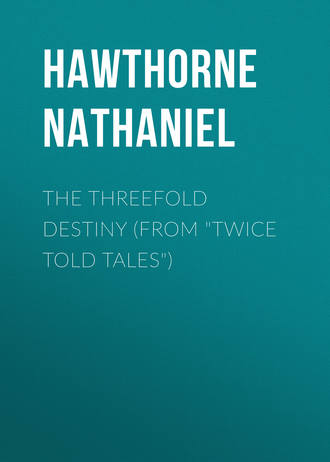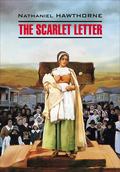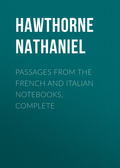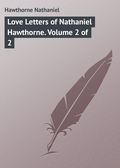
Натаниель Готорн
The Threefold Destiny (From "Twice Told Tales")
And, secondly, Ralph Cranfield had a firm belief that there was a mighty treasure hidden somewhere in the earth, of which the burial-place would be revealed to none but him. When his feet should press upon the mysterious spot, there would be a hand before him, pointing downward, – whether carved of marble, or hewn in gigantic dimensions on the side of a rocky precipice, or perchance a hand of flame in empty air, he could not tell; but, at least, he would discern a hand, the forefinger pointing downward, and beneath it the Latin word EFFODE, – Dig! And digging thereabouts, the gold in coin or ingots, the precious stones, or of whatever else the treasure might consist, would be certain to reward his toil.
The third and last of the miraculous events in the life of this high-destined man was to be the attainment of extensive influence and sway over his fellow-creatures. Whether he were to be a king, and founder of an hereditary throne, or the victorious leader of a people contending for their freedom, or the apostle of a purified and regenerated faith, was left for futurity to show. As messengers of the sign, by which Ralph Cranfield might recognize the summons, three venerable men were to claim audience of him. The chief among them, a dignified and majestic person, arrayed, it may be supposed, in the flowing garments of an ancient sage, would be the bearer of a wand, or prophet’s rod. With this wand, or rod, or staff, the venerable sage would trace a certain figure in the air, and then proceed to make known his heaven-instructed message; which, if obeyed, must lead to glorious results.
With this proud fate before him, in the flush of his imaginative youth, Ralph Cranfield had set forth to seek the maid, the treasure, and the venerable sage, with his gift of extended empire. And had he found them? Alas! it was not with the aspect of a triumphant man, who had achieved a nobler destiny than all his fellows, but rather with the gloom of one struggling against peculiar and continual adversity, that he now passed homeward to his mother’s cottage. He had come back, but only for a time, to lay aside the pilgrim’s staff, trusting that his weary manhood would regain somewhat of the elasticity of youth, in the spot where his threefold fate had been foreshown him. There had been few changes in the village; for it was not one of those thriving places where a year’s prosperity makes more than the havoc of a century’s decay; but like a gray hair in a young man’s head, an antiquated little town, full of old maids, and aged elms, and moss-grown dwellings. Few seemed to be the changes here. The drooping elms, indeed, had a more majestic spread; the weather-blackened houses were adorned with a denser thatch of verdant moss; and doubtless there were a few more gravestones in the burial-ground, inscribed with names that had once been familiar in the village street. Yet, summing up all the mischief that ten years had wrought, it seemed scarcely more than if Ralph Cranfield had gone forth that very morning, and dreamed a daydream till the twilight, and then turned back again. But his heart grew cold, because the village did not remember him as he remembered the village.
“Here is the change!” sighed he, striking his hand upon his breast. “Who is this man of thought and care, weary with world-wandering, and heavy with disappointed hopes? The youth returns not, who went forth so joyously!”
And now Ralph Cranfield was at his mother’s gate, in front of the small house where the old lady, with slender but sufficient means, had kept herself comfortable during her son’s long absence. Admitting himself within the enclosure, he leaned against a great, old tree, trifling with his own impatience, as people often do in those intervals when years are summed into a moment. He took a minute survey of the dwelling, – its windows, brightened with the sky-gleans, its doorway, with the half of a mill-stone for a step, and the faintly traced path waving thence to the gate. He made friends again with his childhood’s friend, the old tree against which he leaned; and glancing his eye a-down its trunk, beheld something that excited a melancholy smile. It was a half-obliterated inscription – the Latin word EFFODE – which he remembered to have carved in the bark of the tree, with a whole day’s toil, when he had first begun to muse about his exalted destiny. It might be accounted a rather singular coincidence, that the bark, just above the inscription, had put forth an excrescence, shaped not unlike a hand, with the forefinger pointing obliquely at the word of fate. Such, at least, was its appearance in the dusky light.






